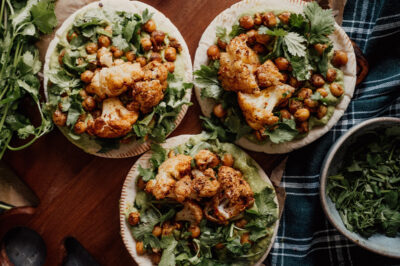Calling all conscious-foodies! We know you love your organic, high quality and nutrient rich foods, as this type of selection is all the rage these days (as it should be). From green smoothies and juices to paleo and grain free goodies, the evolution of our culture and what we eat is pretty commendable. We’ve incorporated ancient concepts of nutrition into a modern day relationship with food. We’ve managed to restore our connection with the earth, allowing us to re-route and root our basic principles of eating clean—hallelujah!
But why do our tummies still ache? Why is their still bloating and discomfort present in our guts even after eating a healthy, organic meal?
This is where some digestive physiology chimes in, as proper food combining is essential for optimal digestion.
What is Food Combining?
Food combining is eating foods that breakdown at relatively the same speed through enzymatic action, resulting in healthy digestion and assimilation of nutrients. With improper food combining, conditions like gas, heartburn, acid reflux, bloating, constipation, diarrhea and IBS are likely to develop, particularly with long term, improper food combining happening in your diet.
When we eat even simple foods, but in the wrong combinations, certain compounds like proteins might remain undigested in our guts, causing fermentation. Once food ferments in the intestines, it creates an acidic environment that allows harmful bacteria and yeasts to interfere with proper detoxification and elimination of waste.
Unfortunately, this build up of undigested food not only leads to potential gastrointestinal issues, but can also exacerbate skin conditions like eczema, psoriasis, rosacea and acne. Tis true! Our skin is a reflection of what is happening inside.
So, what are the do’s and don’ts of food combining?
Guidelines For Optimal Digestion
1. Fruits
Fruits digest best when eaten alone, in the morning or at the beginning of a meal. They digest very quickly, within 30 minutes of eating. Not all fruits digest well together, though. For example, melons should always be eaten alone, as they digest completely differently than any other fruit.
Fruits are best combined with greens, in salads or smoothies. Acidic fruits like oranges, tomatoes, lemons and pineapples should not be eaten with proteins such as meat or eggs, but rather with protein fats like avocado, cheese or nuts.
2. Greens and Non-Starchy Vegetables
Greens and non-starchy vegetables are fairly neutral foods. Rich in enzymes, fiber, amino acids, essential vitamins and minerals, these foods combine wonderfully with all proteins, carbohydrates, fats and oils (avoid melons!) and should be eaten daily with every meal, if possible. Side of greens with cake, anyone?
Non-Starchy vegetables include: greens, lettuces, broccoli, celery, mushrooms, onions, garlic, radishes, sprouts and zucchini.
3. Whole Grains and Starches
Pair whole grains and starchy vegetables with greens, while avoid pairing starches with a protein such as meat or beans.
The common American diet is a meat with potato type, but this is probably the worst food combination you can eat. Our bodies require an acid base to digest protein and an alkaline base to digest starches, so when eaten together, this combo can really take a toll on our guts, causing a traffic jam of indigestion.
Starches include: Grains, breads, pastas, sweet potato, carrot, pumpkin, squash, etc.
So, is eating a burger with fries optimal? No.
But it’s free-range on a gluten free bun! No.
Rice with beans? No.
Chicken pad thai? Not really.
Leafy green salad with your favorite meat and veggies? There we go!
4. Proteins
Two rules for consuming proteins:
Do not eat proteins with fats. Eating fats like cream, butter and oil with proteins such as meat, eggs, cheese or nuts, inhibits your stomach’s gastric juices from breaking down proteins properly, which might cause you some tummy trouble.
Do not mix different proteins in the same meal. This means avoid eating nuts with meat, cheese with nuts, eggs with meat, or cheese with eggs, and so on. Each protein requires a different type of digestive juice. Mixing is no-bueno.
Proteins should also be consumed first because they require the most enzymes. When you eat a protein after eating a starch, the acids in your stomach may not break down the foods sufficiently, resulting in that post-dinner bloat.
5. Sugars
Sugar and starches eaten together should be avoided, as this combination causes fermentation in the gut. I know this is nearly impossible, as most sweet treats are exactly that, but try and limit your consumption of desserts. (Easier said than done)
If you’re going to have dessert, it is recommend to eat it before dinner (since it digests quickly) or wait until 4 hours after dinner.
Sugar is best eaten alone, like in a cup of tea or not at all…Deep breaths, here!
The Basic Breakdown
- Proteins with Starches = improper combination
- Proteins with Vegetables = proper combination
- Starches with Vegetables= proper combination
- Proteins with other Proteins= improper combination
- Fats with Proteins= improper, pair in moderation
- Fats with Starches= proper combination
- Fruits= eat alone or on empty stomach
- Fruits with greens= proper combination
Of course there are many cultures whose cuisines are naturally not “proper” food combining such as Mexican, South American, Mediterranean or even Asian, but for people native to these areas, their food combinations work for them.
Americans, on the other hand, have every type of cuisine and junk food available to them. We also have every type of disease and discomfort under the sun due to poor diets. So, while food combining might not be the “cure all” for everyone experiencing gastrointestinal issues, it has deemed success for many people.
What do you think of food combining for gut-health? Has eating this way helped with your ailments?
By: Abby Stoecker
Sources:
Gates, Donna. ‘The Body Ecology Diet: Recovering Your Health and Rebuilding Your Immunity’. Hay House. June 2011.
http://articles.mercola.com/sites/articles/archive/2013/10/27/food-combining.aspx
http://www.holisticallyhaute.com/2014/06/should-you-care-about-food-combining.html








I live this style since my childhood. My grandmother started it because I had food intolerance. Whenever I break this, I pay the price. I’m so appreciate I had a chance to learn this so early in my live.
Smart post, my lady Annmarie, very helpful advice. I have tried to maintain these ‘rules’ for years. Yet I find it difficult when my dear husband wants to eat dessert moments after I have prepared and served him good food, much like your combining advice suggests.
Yikes,
“.”